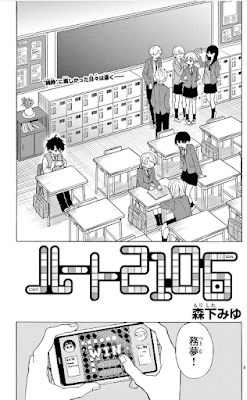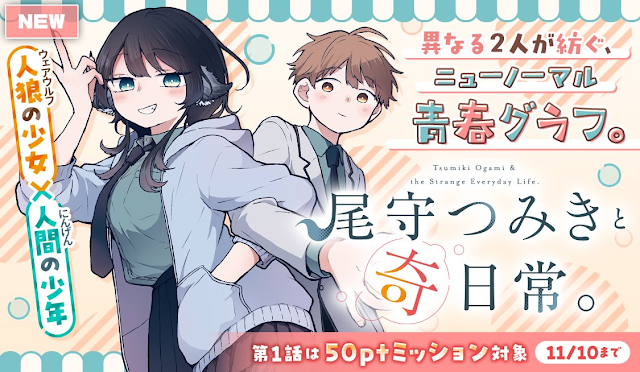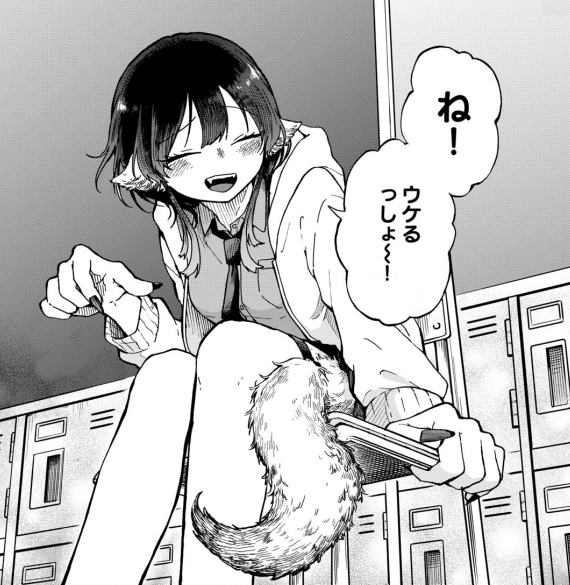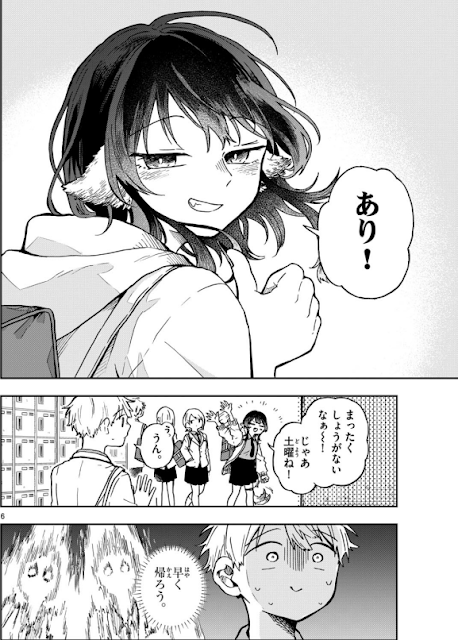Now with the second of two new serials arriving in Weekly Shonen Sunday! Like Ota before, Morishita has done a few oneshots in the Shougakukan family of magazines with this being their first serial. It is a work that's very unlike Shuusekiban go 0 ban however! Let's give it a go.
The Artist
Miyu Morshita
(Left Kimi to nara hadashi, Right: Sonna Koi)
(Left Soredewa mou o aishimasen you/ Right: Route 2106)
Morishita has been in different Shougakukan magazines as far back as 2020 with the first oneshot published on Sunday Webry June 30 of that year. For those who aren't familiar --Shougakukan has a mini manga-in-manga magazine that comes with Sunday Super and Gessan. These mini-magazines are exclusively frequented by rookie mangaka (though some veterans have found their way into them), and sometimes revolve around a theme, or a length. For example, "Sunday Battle 8" which is Shougakukan's current manga-in-manga mag dips into the best of both worlds and is themed manga (ranging from romcom to battle) that are 8 pages. Some bigger names like Kekkaishi's Yellow Tanabe have participated in these contests, but again these are usually for newer artists to show their stuff. In the past, especially the Gessan (Monthly Shounen Sunday) mini wouldn't have a page count limit and come as a bonus with the print edition of the magazine. Morishita's oneshot Route 2106 ran in one of these (pictured above second row, right) while their other oneshots tended to be in WSS or webry. Their earliest one Soredewa mou o aishimasen you (Second row, left) was on webry as the aforementioned 2020 entry. Meanwhile, Route 2016 was published in a Gessan supplementary magazine. This is all to say that Shougakukan puts a major focus on fostering new talent!
To dig into the oneshots briefly we'll start with Soredewa. In this story the protagonist is Nozomi, a girl who has just died and is somehow attending her own funeral. A man suddenly appears before her and asks if she has any unfinished business, and to his surprise, she says no. There's nothing in life she didn't get to do, nor does she have any regrets.
It turns out she only feels this way because the one time she decides to do something a little different as a usually mousy and reserved honor student ala a makeover, her parents yell at her and the girls she was trying to get close to reject her. Then well...she dies.
Ahh Truck-kun, we meet in the strangest places, don't we?
So yeah, she feels like there wasn't much to life for her, but it's through the guide that she realizes two things. One: Her whole class is at her funeral weeping for her, and two, she's not the world's unluckiest pretty girl at all. In fact upon revisiting her life she finds she was actually quite happy.
Now she does have a regret, dying young. Luckily her guide isn't just some random ghost, no he's the big wig in the underworld, Enma, and this funeral is in fact a gathering of ayakashi posing as her friends. Turns out she's just in the hospital and she'll be okay! So it's a kind of Wonderful Life scenario except a lot less dire, with the main concern lying with the ayakashi being scared of her discovering their identities. Luckily she doesn't and will recover eventually. The title of the oneshot comes in here as well-- it literally means So that we don't meet again which until the end sounds like her wish to die and disappear, but it is in reality Enma wishing her to treasure her life and go to a nicer place when it's really her time to go.
Next is Route 2106. This oneshot is more straightforward, with a trio of schoolmates in a love triangle, sort of. "Sort of" being that while the black haired girl Naoe is in love with the blond haired girl Hiyo, it's not quite as clear how the boy feels about her, even though it's Hiyo who crushes on him. So feelings are all over the place, and it's not helped that they're childhood friends. The three have bonded over games (board games) for as long as they can remember but as they get older, the distinction between them --specifically gender begins to show and the boy thinks he has to bow out because he's not like them. Despite herself, Naoe drags him back as even though she's jealous she still thinks of him as a friend. The oneshot doesn't end with a clear winner --more of a hopeful note for those who like their yuri (though Naoe promises to slaughter the guy if he ever tells Hiyo of her feelings). This oneshot is more about the relationship of the trio than developing into an actual rom-com proper.
The next two oneshots we've discussed on social media so I won't go too deeply into them. Rather, I'll just link to the threads and give a quick rundown.
From WSS issue #49 of 2021 comes Kimi to Nara hadashii or, If it's you, I'll go Barefoot. The oneshot (in Japanese of course) is up here on Sunday webry and our impressions on it are here on X (formerly twitter). This oneshot feels more like a prototype for Ogami Tsumiki to kinichijou with the supernatural being the "new normal" and a human boy finding himself friends with a monster gal.

The major difference here is while Tsumiki is comfortable in her skin, or fur, Komiya is embarrassed by her transformation into a mer-person whenever she gets wet.
It's fascinating to me how just taking core elements and reversing them creates an almost entirely different story. Though for more details hit up our thread! We'll get to Tsumiki in a moment.
Sonna Koi or That's Love?! was featured in Issue #13 of 2021. The oneshot is here and the thread with our impressions is here. Once again, Morishita plays with the idea of a typical romcom in this one where an angel who just wants to get back to his shojo manga is forced by his boss --a female God to enhance a human girl's love life.
Way back, I was thinking this'd make a good series and now upon re-read? My feelings haven't changed. It's so weirdly off kilter how Sumire has the power to just force her crush to like her, but instead chooses to tip the scales eeeeeever so slightly so they hang out more instead. I think out of all of the oneshots I like this one the most, as it showcases what Morishita-sensei is best at, which is high schoolers and their strange yet endearing relationships with one another. Whether it be supernatural, LGBT or platonic, relationships are weird, hard, sticky things that all one can wonder is why they bother with them in the first place. Though it's through Morishita's cute artwork and stories that readers can look inward and realize how silly these budding feelings can be --or that notwithstanding, get a good chuckle out of Morishita's character interactions. Not only that, but the Sunday heroine-ism is strong in these as all four oneshots have one thing in common --prominent female leads that are all unique. This is a quality Morishita takes into their first long term serial as well.
The Serial
Ogami Tsumiki to Kinichijou
A Baton Pass Between the characters of Tsumiki and Kimi to Nara
Starting in Shonen Sunday's #46th issue is Miyu Morshita's first long term serial, Ogami Tsumiki to kinichijou. or Ogami Tsumiki's (ab)normal life. The blurb introduces the series as a "New normal adolescent life" between a werewolf girl and a human boy. Again, not too different from Kimi to nara, but with enough tweaks here and there to be a unique story.
The Premise
In a class setting, there's that one student who doesn't stand ou---wait, I wrote that for the last entry? Huh, weird.
Joking aside, Yutaka Shinsou is a boy who up until now has just gone with the flow to a point that he's not sure of his own identity. Figuring that High School is a good time to figure this out, he purposely goes out of his way to attend a school far from his house in order to make friends who may have the same issue he does --getting too caught up in reading the room to really be himself. Except in the society within the story, a new-ish movement of people, or, well, not people are on the rise. These folk are known as "Genjin" a made-up word in Japanese that uses the kanji for "illusionary" and "person." So it'd literally be something like "phantoms" but for the purposes of this review I'll go with "beast folk." When this series totally gets licensed by someone, I'm sure they'll have a better name. wink wink.
It's here that he meets the titular heroine, Tsumiki Ogami who's a werewolf beastfolk. She's completely unlike Morishita's other heroines as she's flighty, a little self-centered, kinda air brained, self-assured and kind. Her character making moment is being introduced, bending the shoe locker door because she can't fit her absurdly fly (and big) shoes into it. Yutaka's very obvious suggestion of putting the shoes on top of the locker, something she never even gave thought to. Before going on, Ogami Tsumiki to kinichijou's storytelling is unique in that rather than being told via a chapter by chapter basis, it's more along the line of several vignettes put together into a chapter instead. Now that approach isn't unusual for first chapters in Sunday, but as of this writing it's continued into the third chapter as well. Komi Can't Communicate has done this on occasion as well, but hasn't done it for this many chapters in a row as far as I remember, so it adds a layer of uniqueness to this manga --and the unconstrained nature of WSS serials. Morishita isn't constrained into getting an idea to stretch over 18 pages and can change gears as they see fit, which as evidenced by the chapters out so far do wonders for conveying a sense of organic flow and structure to the daily lives of the characters.
The first chapter breezily introduces Yutaka and the titular Tsukimi and then surprisingly covers a lot of background lore. For one thing Tsukimi says that not everyone becomes a full beast at the sight of a full moon. It depends from wolf to wolf. She doesn't, however, but if she sees a picture of the moon she can't help but howl at it which leads to a cute moment of her trying her best to styfle it when a student pops up with a pic of the moon out of curiosity. Furthermore she doesn't eat people for now. When someone asks if she eats human meat, she replies "I don't for now" and Yutaka also thinks to himself that this could be interpeted as an openness to try. In short, Tsukimi is very open about who she is and fields questions from everyone. Even her rather huge shoes as seen in the color page are to include her claws which rip through her socks often. Rather than being annoyed by this however, she rolls with it and laughs when Yutaka accidentally snickers at her misfortune.
She even does wolfy things like bury her food to get it later, (still not a human, rather just a sandwitch) and gets so into digging that she comes back a mess. Yet with all of these inconvinences from a human standpoint she looks at us and thinks "Man it's tough being you guys." Being a beastfolk is built into her and she's made peace with that, while humans are flexible and adaptable to an almost fault. We try so hard to fit in that in some cases like Yutaka it's easy to lose sight of who or what we are. It's a poignant lesson coming from an unlikely source in Tsumiki, and surprisingly well thought of for a series that is about an "abnormal" normal life.
Tsumiki isn't kissing and telling here --she says this is just a greeting. Morishita is playing coy with the center relationship --is what I'd say if this were advertised as a rom com. The terms used for the series is "abnormal, normal life" with the romcom label conspicuously being absent, which is a good call. The "will they, won't they?" aspect of the series is tantilzing to those who do want romantic tension, but at the same time it's not a promise, so Morishita can take time to develop the characters as they see fit. Though that being said Yutaka probably wouldn't know what his feelings are because he's not sure who he is quite yet. Tsumiki on the other hand is too easygoing to really think about anything deeply so prepare for a slow burn, rom-com lovers.

As of this writing there are three chapters out, and the narrative continues it's laid back while simutaneously breezy pacing, going from Yutaka realizing Tsumiki already has a fan club to defying pressure from said club to go to her house and discovering the werewolf's dwelling and Tsumiki's family. Again, it's surprising just how much lore is packed into the series as Tsumiki reveals the wolves dig holes in the mountains and live in them. While beastfolk are now recognized and thus can live among humanity, many of them still choose to stay in the mountains with some wolf children never leaving the homestead. It's the little details that flesh out a world, and it's even more impressive when the series itself doesn't need them to focus on it's center duo. Even moreso when Tsumiki's little sister reveals that her older sister is carrying a burden --wolves are trying to move into the surface with the humans so she's a test case --if she does well with society then it'll give more of the youngsters hope that they can do the same. Though to Tsumiki she's just being herself and doesn't think much of it. Still, it's impressive just how much gravitas this series has when it is on it's face a slice of life.
The Verdict
Ogami Tsumiki to kinichijou has the markings of the wolf I mean, the potential to, no, is something special. One part literal fluff, with some surprisingly well thought out world building, and social commentary on what it is to be oneself in a world that's changing every day. There's a prevailing energy throughout the series of not trying too hard whether it be Tsumiki helping Yutaka find his feelings or Morishita's writing, it all congeals into a series that is more than normal --it's abnormal in all the best ways. Not only that but with the introduction of other characters and the soft, but approachable artwork the series could go a long time without feeling contrived, especially with Morishita's frankly ingenious decision to forgo making romance the standout selling point and thus keep expectations reasonable. The magazine has other slice of life school series in it, but what makes Tsumiki stand out from them aside from it's choice to go with vigenettes and preserve it's wonderful pacing is that everything comes together so effortlessly making for a charming, relaxing read --the type that you can only find in Weekly Shonen Sunday.




























Comments
Post a Comment